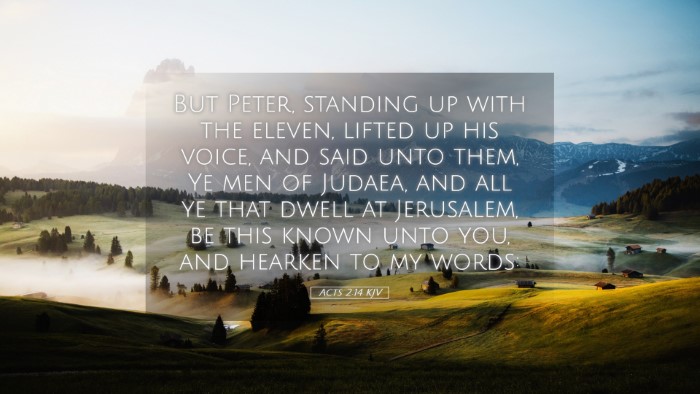Commentary on Acts 2:14
Acts 2:14 states: "But Peter, standing up with the eleven, lifted up his voice, and said unto them, Ye men of Judaea, and all ye that dwell at Jerusalem, be this known unto you, and hearken to my words:" This pivotal moment in the early church sets the stage for the first apostolic sermon following the outpouring of the Holy Spirit at Pentecost. This verse is rich with theological significance and contextual importance.
Contextual Background
The book of Acts, authored by Luke, presents the transition of Jesus’ followers from a small group of disciples to a vibrant, dynamic community empowered by the Holy Spirit. Acts 2 recounts the Day of Pentecost where the Holy Spirit descends, fulfilling Jesus' promise to His followers. The event draws a large crowd of Jews gathered in Jerusalem for the Feast of Weeks, making it a prime opportunity for evangelism.
Peter's Role
Peter's action of standing up with the eleven signifies leadership and solidarity with the other apostles. According to Matthew Henry, this demonstrates the transition from doubt to boldness in Peter’s character, contrasting sharply with his earlier denials of Christ. Here, he takes on his role as a leader of the Church.
Albert Barnes emphasizes Peter’s authority and the significance of his action. By standing before the crowd, Peter asserts the validity of the apostles’ testimony concerning Jesus. This act is a demonstration of courage, moving from a place of fear into one of proclamation.
Exegesis of "Lifted Up His Voice"
The phrase "lifted up his voice" illustrates the urgency and passion with which Peter addresses the crowd. Adam Clarke notes that this indicates a call to attention, reflecting the emotional and spiritual fervor accompanying the moment of proclamation. It suggests that the message that follows is vital for all present to heed.
Furthermore, the act of raising his voice signifies that the message is for everyone – a call to repentance not just for the select few, but for all of Jerusalem and beyond. This underscores the universality of the Gospel message.
Audience Awareness
By addressing “Ye men of Judaea, and all ye that dwell at Jerusalem,” Peter is catering his message to a specific demographic deeply rooted in Jewish tradition. Matthew Henry comments on Peter’s strategy, noting that he appeals to the cultural and religious identity of his audience to establish common ground. He recognizes their background and the implications of the miraculous event they just witnessed.
Moreover, this public declaration serves as an intentional invitation to introspection regarding their relationship with Jesus. Peter seeks to explain the significance of the events of Pentecost in relation to their understanding as Jews.
The Theological Implication of "Be This Known Unto You"
The phrase “be this known unto you” signifies a transition from observation to understanding; it is a clarion call to discernment. Albert Barnes notes that this is not merely about proclamation but about imparting understanding. Peter aims to clarify misconceptions about the Holy Spirit and the phenomena of the day.
This phrase acts as an emphasis on the importance of the message that follows. It is a call to open hearts and minds, fostering an environment receptive to the Gospel. The subsequent verses detail the core of this message: the validation of Jesus’ resurrection and the hope it brings.
Application for the Church Today
Peter's bold proclamation serves as a model for contemporary evangelism. Adam Clarke points out that this passage invites churches today to stand firm in their testimonies and to communicate the Gospel with clarity and conviction. The diverse audience in Jerusalem mirrors the challenges that modern churches face in addressing varied cultural backgrounds and ideologies.
Moreover, the call to “hearken to my words” is a reminder of the necessity for preachers and teachers to invite listeners into a transformative engagement with the Word of God. This verse challenges ministers to cultivate an environment where understanding of scripture is paramount and where the Holy Spirit can work to enact change in the hearts of the congregation.
Conclusion
Acts 2:14 is a profound verse that introduces a moment of bold witnessing and proclamation in the early church. Drawing insights from public domain commentaries reveals its significance for leadership, audience engagement, and the role of the Holy Spirit in empowering believers. As Peter stands in front of the masses, he exemplifies what it means to faithfully articulate the Gospel in response to God’s transformative acts. This passage challenges contemporary believers to embody a spirit of boldness, clarity, and urgency in proclaiming the good news of Jesus Christ.


